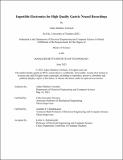Ingestible Electronics for High Quality Gastric Neural Recordings
Author(s)
Gierlach, Adam Matthew
DownloadThesis PDF (10.33Mb)
Advisor
Traverso, Carlo Giovanni
Chandrakasan, Anantha P.
Terms of use
Metadata
Show full item recordAbstract
Recent advances in understanding the gut-brain axis, functional gastrointestinal disorders, and gastric stimulation therapies have highlighted the importance of the electrical signals that regulate the gastrointestinal (GI) tract. Current systems for measuring neural signals from the GI tract involve acute, invasive procedures that change the underlying electrical behaviors or cutaneous recordings which measure highly attenuated signals. This thesis describes the development of a non-invasive device for long term gastric recordings in freely moving patients known as Multimodal Electrophysiology via Ingestible Gastric Untethered Tracking (MiGUT). The custom device and electrodes are designed to conform to the stomach wall, wirelessly transmit high quality signals, all while fitting in an ingestible form capable of being easily delivered into the GI tract. MiGUT is shown to record the gastric slow wave in-vivo in pigs, along with signals that align with the heart and respiratory rate, and measure the expected response to prokinetic therapeutics. Multi-day measurements were obtained using MiGUT in a freely moving pig, recording changes in the slow wave during different behaviors with no artifacts observed during ingestion or movement. This type of data could enable a new level of understanding of one’s GI tract, for health tracking and personalized diagnostics.
Date issued
2023-06Department
Massachusetts Institute of Technology. Department of Electrical Engineering and Computer SciencePublisher
Massachusetts Institute of Technology